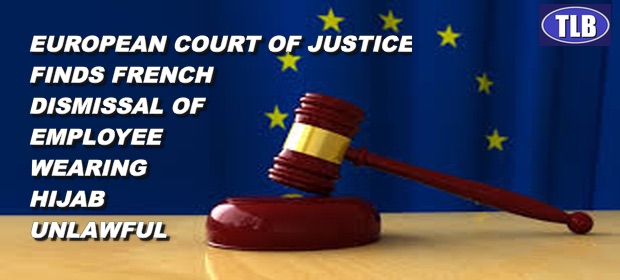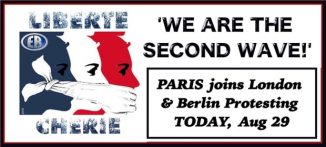
Asma Bougnaoui, who lost her job at an IT consultancy, should have been allowed to wear headscarf, says EU court advocate
By Owen Bowcott Legal affairs correspondent
A French design engineer who was dismissed for wearing an Islamic headscarf should have been allowed to cover her head at work, the European Union’s highest court has recommended.
In an influential preliminary opinion, an advocate general at the European court of justice has found in favour of Asma Bougnaoui, a Muslim woman, who lost her job with Micropole SA, a French IT consultancy, in June 2009.
Advocate Eleanor Sharpston, one of the senior British members of the judiciary on the Luxembourg court, said an EU directive prohibiting discrimination on the grounds of religion or belief should be interpreted strictly and that Bougnaoui’s dismissal amounted to direct discrimination on those grounds.
There was nothing to suggest that Bougnaoui was unable to perform her duties as a design engineer because she wore an Islamic headscarf, the opinion noted. Indeed, Micropole’s letter terminating her employment had expressly referred to her professional competence. No exemptions from the directive applied.
An ECJ statement said: “First, the advocate general rejects the idea that a prohibition on employees wearing religious attire when in contact with customers of their employer’s business may be necessary for the protection of individual rights and freedoms necessary for the functioning of a democratic society.

A Muslim French woman demonstrates against the banning of headscarves. Photograph: Alamy
“In any event, in the present case, there does not appear to be any relevant national legislation enacted to give effect to that derogation. Secondly, the derogation for ‘occupational activities within churches and other public or private organisations, the ethos of which is based on religion or belief’ cannot apply given the nature of Micropole’s activities.”
Sharpston said that had Bougnaoui completely masked her face, she would not be protected by law. “Western society regards visual or eye contact as being of fundamental importance in any relationship involving face-to-face communication between representatives of a business and its customers. It follows in my view that a rule that imposed a prohibition on wearing religious apparel that covers the eyes and face entirely whilst performing a job that involved such contact with customers would be proportionate.”
In a forceful comment, Sharpston concluded: “It seems to me that in the vast majority of cases it will be possible, on the basis of a sensible discussion between the employer and the employee, to reach an accommodation that reconciles adequately the competing rights of the employee to manifest his or her religion and the employer to conduct his business.
“Occasionally, however, that may not be possible. In the last resort, the business interest in generating maximum profit should then in my view give way to the right of the individual employee to manifest his religious convictions. Here, I draw attention to the insidiousness of the argument, ‘but we need to do X because otherwise our customers won’t like it’.
“Where the customer’s attitude may itself be indicative of prejudice based on one of the ‘prohibited factors’, such as religion, it seems to me particularly dangerous to excuse the employer from compliance with an equal treatment requirement in order to pander to that prejudice. [EU] Directive 2000/78 is intended to confer protection in employment against adverse treatment (that is, discrimination) on the basis of one of the prohibited factors. It is not about losing one’s job in order to help the employer’s profit line.”
Advocate general opinions are usually followed when the ECJ finally delivers its subsequent full judgment. ECJ rulings are legally binding on all EU member states and will be enforceable in the UK until British withdrawal has finally been achieved. Boris Johnson criticised the powers of the ECJ during the Brexit campaign.
Sharpston said a company policy requiring an employee to remove her hijab when in contact with clients constitutes unlawful direct discrimination.
************
ER recommends other stories by the Guardian




